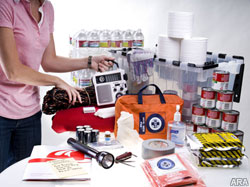
(ARA) – When most people think of disaster striking their homes, they think of the things they would lose.
“The most important question is: ‘What should we save,'” says Lyman Munson, head of risk services at Fireman’s Fund Insurance. “There’s an easy answer to that query: When disaster strikes, family comes first.”
Whether it’s a wildfire, hurricane, tornado, flood or another natural disaster altogether, your family should know what to do when in danger. Visit facebook.com/disasterinfo for more information, and follow this list of simple disaster preparedness tips that will help your family stay safe.
Evacuation plan: Your family should have a practiced, effective evacuation plan agreed upon beforehand so that you’re ready to go when the unexpected hits. Make sure each room in your home has at least two exits and that each member of your household is clear on the easiest way to evacuate your home. If you have a multi-level home, be sure to have an escape plan from upper stories. It is recommended to keep a collapsible fire ladder next to your upper-level windows for easy exit through the window.
Make a list: With your family members, make a list of important things that you would want to take with you in case of an evacuation. This list could include things like medicine, eyeglasses and important documents. Keep these things in a safe, easy-to-reach place.
Emergency supply kit: Put together a kit of basic survival supplies to provide for your family in case of evacuation or isolation. In addition to basic survival supplies, be sure to include some items to cheer up your family like books, candy or toys.
Keep a home inventory: Pick up a video recorder or a digital camera and walk around each room of your house documenting your belongings. This is an important and time-saving step and will be useful if filing insurance claims after a disaster. Store your documentation on a password protected site online where you can access it away from your home. The Insurance Information Institute also makes www.knowyourstuff.org available free of charge.
Keep your insurance information handy: Store information about your insurance policy and insurance agent in your mobile phone or online (or both) so that you will be able to access it from outside your home. This information, along with a detailed home inventory will be important when dealing with the after effects and losses of a natural disaster.
Here are some ideas for preparing your family for specific natural disasters that affect different parts of the country:
Hurricanes
Protecting all your windows and doors is the No. 1 way you can protect your home from hurricane damage. Make sure your windows and doors have proper approvals for large-missile impact and wind pressure.
Keeping your roof in good condition is an important way to protect yourself from leaks and other forms of damage. Edge shingles should be well fastened and should not extend beyond the drip edge more than 1/4 inch. Secure old, brittle or loose shingles with three 1 inch dabs of roofing cement under each tab.
Wildfires
Zoned, fire-resistant landscaping can help reduce your risk of wildfire. Check with your local fire department or nursery for a list of fire-resistant plants to grow in your yard.
Choose heat-resistant such as cement, plaster, stucco or concrete masonry for the walls of your home. Flame-resistant walls will help contain fires and decrease the probability that a fire will spread to the rest of the house.
Tornadoes
If you are replacing your existing windows, install impact-resistant window systems, which have a much better chance of surviving a major windstorm. If you are unable to find them locally, you can order them from manufacturers or home improvement stores in coastal areas.
Make sure you have sturdy hinges and a deadbolt security lock with a bolt 1 inch long on your doors. Door frames should be anchored securely to wall framing.
Earthquakes
Install latches on cupboard doors to ensure they don’t open during a quake.
Do not put heavy artwork, mirrors or shelves over beds. Store heavy items or glassware in lower cabinets so they do not become dangerous during a quake.
Floods
Place your valuables above the floor level of your home. Avoid stacking your boxes on the floor level in case boxes become damaged and collapse.
Use landscaping, site grading and the location of drains and sewers to control and contain the direction and flow of excess water in case of a flood. Install sump pumps with a back-up generator (in case of electricity failure) to quickly remove water from your home.





